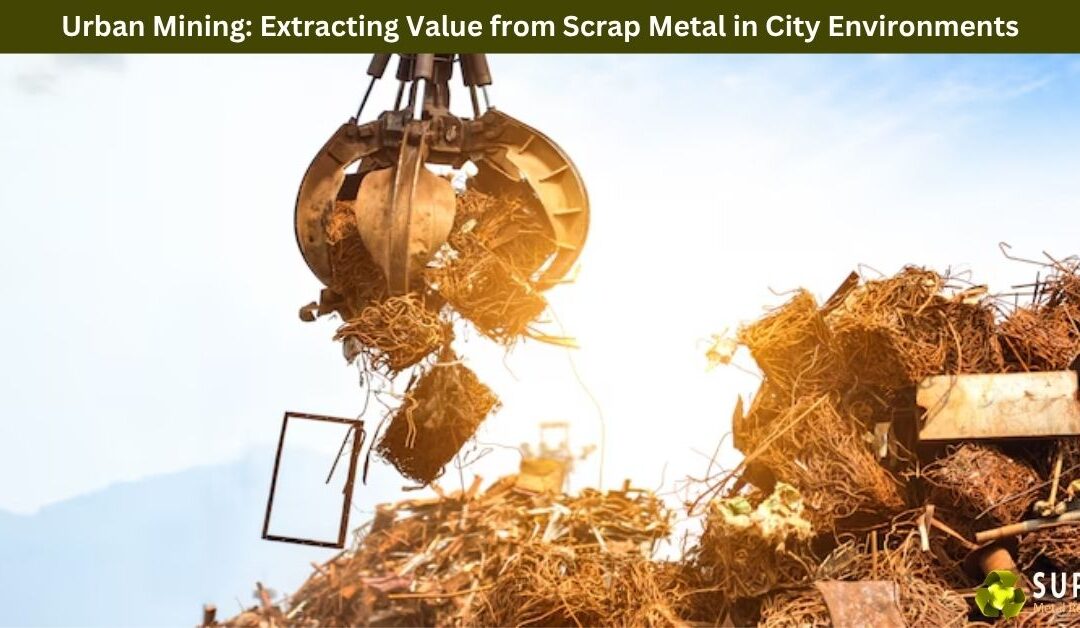When you hear the word “mining,” you probably picture giant trucks, dusty hillsides, and remote excavation sites. But what if we told you that cities—yes, our very own city streets, buildings, and even junk drawers—are full of valuable resources just waiting to be recovered? Welcome to the world of urban mining.
Urban mining is a fresh take on resource recovery, and it’s becoming more important than ever as cities grow, technology evolves, and the demand for metals skyrockets. In this post, we’ll break down what urban mining is, why it matters, and how scrap metal plays a central role in this smart, sustainable approach.
What Is Urban Mining?
Urban mining is the process of recovering valuable materials—especially metals—from old buildings, electronics, vehicles, appliances, and even landfills within urban environments. Instead of digging into the earth for raw minerals, we look at what’s already above ground.
It’s like turning your city into a modern-day gold mine—but instead of gold, we’re after copper, aluminium, steel, and rare earth elements.
And the best part? Most of this material is already accessible. Think of:
- Discarded smartphones and laptops
- Old air conditioners and washing machines
- Wiring and piping from demolished buildings
- Retired vehicles and industrial equipment
Each of these items contains metals that can be recovered, reused, and kept in circulation—no need for mining virgin ore.
Why Urban Mining Matters
There’s a reason this concept is gaining serious traction, especially in environmentally-conscious cities like Melbourne.
- Resource Scarcity
Many of the metals we rely on—like copper, lithium, and cobalt—are finite. Extracting them takes a toll on the planet and becomes more expensive as easy-to-reach deposits are depleted. Urban mining offers a way to close the gap without further environmental damage. - Environmental Impact
Traditional mining is energy-intensive and often destructive to ecosystems. Urban mining dramatically reduces carbon emissions and eliminates the need for massive land disruption. - Waste Reduction
Instead of letting valuable metals sit in landfill or rot in garages, we can collect and reuse them. It’s a double win: less waste, more reusable material. - Economic Opportunity
Urban mining isn’t just good for the planet—it’s good for business. It creates local jobs in collection, sorting, and processing, and reduces the cost of sourcing raw materials.
The Role of Scrap Metal
At the heart of urban mining is scrap metal. Whether it’s copper wiring from a renovation, an old car frame, or parts from outdated appliances, scrap metal is everywhere. And unlike some materials, metals don’t degrade over time, which means they can be recycled endlessly.
Take aluminium as an example. Recycling aluminium uses 95% less energy than producing it from raw bauxite. The same goes for steel, copper, and many other metals—recycling saves energy, cuts emissions, and costs less.
So, when you recycle metal, you’re not just cleaning out your garage—you’re fueling a more sustainable, circular economy.
Urban Mining in Action: Melbourne as a Case Study
Melbourne has long been a leader in sustainability initiatives, and urban mining is no exception. Local governments, construction firms, and recycling services are already tapping into the wealth of materials hidden in our city.
For example:
- Demolition Projects are now expected to salvage as much material as possible. That means recovering steel beams, copper pipes, and even fixtures from old buildings before they’re torn down.
- Electronic Waste Drives across Melbourne suburbs collect everything from phones to fridges, keeping metals in circulation instead of landfills.
- Metal Recycling Services (like ours) work with businesses and homeowners to collect, sort, and process scrap metal from across the city—turning what once was waste into usable resources.
These practices are turning Melbourne into a model city for sustainable resource recovery.
What Can Individuals and Businesses Do?
Urban mining isn’t limited to industrial projects or government policy. Everyday people and local businesses can play a big role too. Here’s how:
- Recycle Your E-Waste: Don’t toss old phones, computers, or cords in the bin. Drop them at a proper recycling centre.
- Sort Scrap Properly: Keep metal separate from general waste. Even small items like cans and wires add up.
- Partner with a Local Recycler: Whether you run a workshop or manage a demolition site, working with a trusted metal recycling company ensures your scrap is reused responsibly.
- Stay Informed: The more you know about where your waste goes, the better choices you can make.
Final Word
Urban mining is more than a buzzword—it’s a smart, forward-thinking way to build cleaner, more resource-efficient cities. By tapping into the wealth already sitting in our homes, offices, and streets, we reduce our reliance on destructive mining and shift toward a circular economy.
A Thought to Carry
The metals we need aren’t always buried deep underground—they’re often right under our noses. Let’s turn our cities into sustainable treasure troves, one piece of scrap at a time.
If you are in Hallam, and looking for a metal recycling service, this is the best way to visit us.
Super Metal Recycling
345 Frankston – Dandenong Road, Dandenong South VIC 3175
(03) 9706 4909


Recent Comments